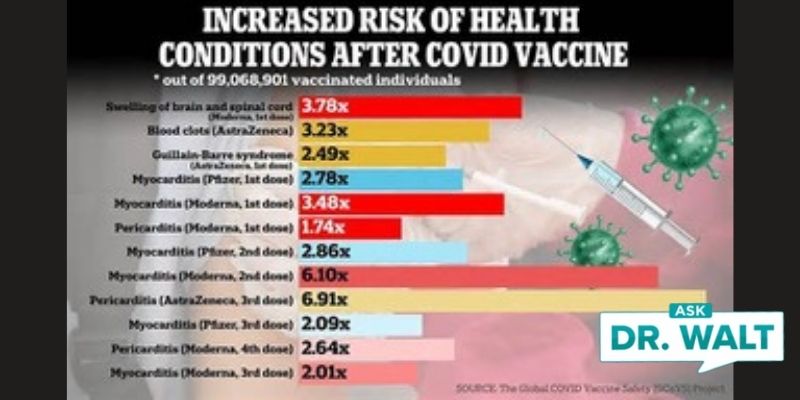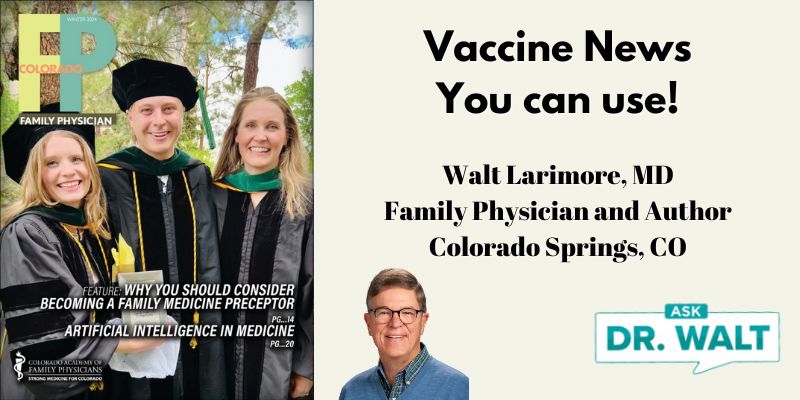More on the Risks of Not Vaccinating Your Children
How to Tell the Difference Between a Cold and the Flu (or Swine or H1N1 influenza)
May 1, 2009Larimore Family Newsletter – May 2009 Edition
May 2, 2009A past blog, that has been very popular, was on the topic of the Risks of Not Vaccinating Your Children (Friday, 6 February 2009). In response to that blog, Kelly wrote, “Hello, I was just wondering if you could answer a question for me. I run a day care out of my home. I was recently inquired about watching a girl who is 2 and has never been vaccinated or seen a doctor. I was wondering if this was any risk to myself or the other children in my day care? Thank you for your time.” I thought you might be interested in my response to her.
More Information:
Hi Kelly,
Thanks for the note. And, yes, unvaccinated children create a risk for other children and adults.
As Dr. Paul Offit writes:
This past year the United States witnessed a measles epidemic that was the largest in more than a decade. About 135 people, mostly children, were infected with measles; some of those children were hospitalized with severe dehydration and others with pneumonia caused by the virus.
Why did this happen? The answer can be found in a study published in December 2008 in the American Journal of Epidemiology that received little attention from the media. The authors, epidemiologists from Johns Hopkins Bloomberg School of Public Health, examined school children in Michigan whose parents had chosen not to vaccinate them.
The study compared clusters of unvaccinated children with clusters of documented whooping cough (pertussis) outbreaks. Not surprisingly, the clusters overlapped. The authors concluded: “Geographic pockets of vaccine exemptors pose a risk to the whole community.”
This is exactly what had happened during the measles epidemic in 2008. Almost all of the children who caught and transmitted measles were unvaccinated. The authors of this study had provided an insight into the obvious.
If parents choose not to vaccinate their children, not only do they put their own children at risk, they put others at risk.
Because no vaccine is 100 percent effective, some vaccinated children can still get pertussis. Others at even greater risk include children who haven’t completed the entire series of pertussis vaccines or those who can’t get vaccines because they are receiving steroids for asthma or chemotherapy for cancer.
The findings of the Hopkins researchers would have been somewhat more tolerable if the choice not to vaccinate was because of legitimate problems with vaccines.
But the reason that some parents are choosing not to vaccinate their children is based on the mistaken notion that vaccines cause autism; or that vaccines cause diabetes or multiple sclerosis or asthma or allergies; or that vaccines weaken or overwhelm the immune system; or that vaccines have not been adequately tested.
Many studies have addressed these concerns and should have reassured parents. But there appears to be a rift between studies that exonerate vaccines and the public’s knowledge of those studies.
This latest study is not the first piece of evidence that a choice not to vaccinate is not a risk-free choice. In 2005, a 17-year old unvaccinated girl visited Romania, caught measles, returned to her home in Indiana, and proceeded to infect at least 34 more people, most of whom were also unvaccinated.
These outbreaks have not, apparently, been sobering. If anything, the number of parents choosing to delay or withhold or separate vaccines is increasing.
So what will it take? Certainly, as more and more children contract measles and pertussis, deaths from these diseases will follow.
And it’s not a leap to believe that we could see other deadly diseases, like polio and diphtheria; both of which still occur commonly in some areas of the world; and both of which are only a plane ride away from causing outbreaks in relatively unvaccinated communities in the United States.
We can only hope that parents have not been lulled into a false sense of security by the success of vaccines — or that our inattention to history will not cause us to relive it.
Kelly, I hope this is helpful information for you.
Dr. Walt
You can read my other blogs on this topic:
- Parents continue to have unwarranted fears and delusions about pediatric vaccines (Wednesday, 25 March 2009).
- Special court rules against families who claim vaccines caused autism (Thursday, 12 February 2009)
- ABCs of Childhood Vaccine Safety (Friday, 6 February 2009)
- Radio Listeners ‘Angry as Hornets’ About Dr. Walt’s Comments on Childhood Vaccination (Wednesday, 4 February 2009)
- Doctor Is Rallying Resistance to the Antivaccine Crazies (Wednesday, 14 January 2009)
- Doctors Debate Delayed Vaccine Schedule (Monday, 5 January 2009)
- Childhood Vaccines: Separating fact from fiction (Wednesday, 5 November 2008)
You can also read my blogs on Vaccine Myths:
- Vaccine Myth #1: Vaccines Cause Autism
- Vaccine Myth #2: Vaccines Don’t Work
- Vaccine Myth #3: Vaccines Aren’t Necessary
- Vaccine Myth #4: Vaccines Are Unsafe
- Vaccine Myth #5: Infants Are Too Young to Get Vaccinated
- Vaccine Myth #6: It’s Better to Be Naturally Infected Than Immunized
- Vaccine Myth #7: Vaccines Weaken the Immune System
- Vaccine Myth #8: A Preservative Contained in Many Vaccines Harms Children
- Vaccine Myth #9: Vaccine-Preventable Diseases Occur More Often in Vaccinated People Than in Unvaccinated People
- Vaccine Myth #10: Vaccines, If Administered during the First Two Years of Life, Can Cause Diabetes
- Vaccine Myth #11: The DTP Vaccine Caused Deafness in the 1994 Miss America Beauty Pageant Winner
- Vaccine Myth #12: The Polio Virus Vaccine Is Contaminated with a Virus That Causes Cancer
- Vaccine Myth #13: Vaccinations are made from aborted babies






